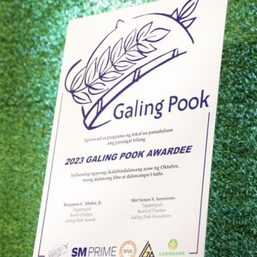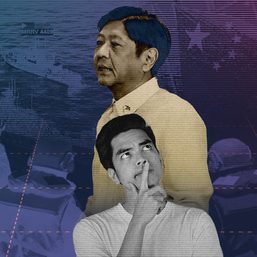SUMMARY
This is AI generated summarization, which may have errors. For context, always refer to the full article.
![[OPINION] S.N.A.F.U.](https://www.rappler.com/tachyon/2021/01/tl-sq-1.jpg)
The term, defined as a “state of complete confusion,” might describe what followed from the president’s revelation on December 26 that PSG personnel had received the Chinese Sinopharm vaccine against COVID-19. Spelled out, the acronym, attributed to World War II US Marines, implies something more serious: “Situation Normal, All F****D Up.”
The PSG did not violate the vaccine queue established by the IATF, as it had not yet been determined when they took the shots in September and October. But they could only have used unregistered, smuggled vaccines, since the FDA has yet to approve any of them.
Officials thus found themselves scrambling to deny knowledge or offer confusing explanations of the president’s statements. President Duterte did authorize the FDA to reduce the review period for drugs from 6 months to one month and, assuming positive results, to issue Emergency Use Authorization (EUA) permits. But the order only came on December 2. As Director General Eric Domingo stressed, the FDA was accountable for ensuring that “only vaccines that pass standards will be made available to the public.” These standards included compliance with all the requirements necessary for the proper handling, storage, and preparation of the drugs before they are given to people.
Domingo disclaimed any knowledge of vaccines entering the country, as did Bureau of Customs Spokesperson Vincent Maronilla. Both acknowledged the possibility of private or government agencies bringing them in without the clearance of their respective agencies. Maronilla noted that the misdeclaration of vaccine shipments as other goods would constitute “technical smuggling.” Reports of a black market trade in vaccines in the NCR indicated that this had happened. Although aware of these reports, FDA, Customs, and the PNP’s efforts to detect this market have so far failed. They might consult with the PSG. In taking command responsibility for the vaccination of his troops, Brig. Gen. Jesus Durante declared: “We vaccinated ourselves. It’s so easy.”
Durante’s declaration effectively cleared the president of any blame for the use of unregistered vaccines, which the FDA and Customs also did. But the agencies did not address questions already publicly raised. Had the president himself availed of unregistered vaccines? Which other government officials might have undergone vaccination? What vaccines were used and when? The snafu needlessly provoked questions about the competence, judgement, or trustworthiness of government officials.
A situation often reaches snafu proportions when triggered by actions causing drastic damage to achieve benefits attainable by easier means.
Heads of state and high official in other countries got priority access to vaccines without provoking public protests. People would have understood and accepted the logic of protecting from infection the people guarding the president. A more competent and confident leadership could have managed early vaccination in a way that did not leave selected recipients seemingly guilty and reluctant to identify themselves, nor those who knew compelled to justify withholding information by invoking privacy rights that appear more protective of high-level administration personnel.
Spokesperson Roque mistook or, as a good lawyer, misdirected the public reaction as mainly motivated by unjustified and unworthy resentment against soldiers performing their duty to protect the president, or grave alarm at violations of the Anti-Graft and Corrupt Practices Act that banned government personnel from receiving gifts from private parties – small potatoes, the public would agree, compared to the far bigger cases of corruption it had seen this year.
The corruption issue was something of a straw man or a red herring thrown into the water to absolve from legal liability the individual PSG soldiers who accepted vaccination. Roque wanted to underline the argument that taking a non-FDA registered vaccine was not a crime; it was buying the unregistered drug that was illegal, an act the recipients did not commit, because the vaccine was given to them. Since the monetary value of the “gift” was modest, Roque could also employ two other favorite rhetorical arguments in his repertory: 1) “Trust me, I am a lawyer; nothing seriously wrong here.” 2) “It happened; let just accept this,” or its alternative formulation, ”Please just let the President have this.”
The ultimate justification would cover a multitude of sins: “The act may have been wrong, but the intention was good.” Not an original or uncommon excuse, but unexpected from an administration that projected itself as the uncompromising guardian of law and order. It was a rationalization that Prosecutor Duterte would have ridiculed out of court. Clearly, something wrong did happen that the public should try to understand and not blindly accept. With his forthright admission of the need for the PSG to explain something it should not have done, DND Sec. Lorenzana emerged relatively unscathed by the controversy.
The PSG vaccination was troubling because of the possible pressure imposed upon soldiers to place themselves at risk with unvetted vaccines, and the precedent it could set for the civilian population. The issue at least established that government did not have a blanket right to force even those subject to military discipline to take unregistered, potentially dangerous medicine. The broader, fundamental concern relates to the problem that has long plagued the country – the issue of impunity and the rule of law.
Do our laws apply only to some and not to others? To what extent can bureaucrats and politicians manipulate, bend, or weaponize the laws to serve particular interests? And what is the citizen’s recourse to those who may be tempted to exercise this power? Chain of command and military discipline notwithstanding, the PSG is still ultimately subject to higher civilian authorities, presumably the DND Sec. and the President. Sec. Lorenzana has already called for the PSG to explain how the vaccine decision was made.
Clarifying and resolving this unfortunate, avoidable controversy will help repair the breach of trust it has caused and help the country prepare for the massive task of delivering the vaccine to the people and reviving the economy – or face the risk of extending and replicating the snafu. – Rappler.com
Edilberto C. de Jesus is professor emeritus at the Asian Institute of Management.
Add a comment
How does this make you feel?
![[OPINION | Just Saying] ‘Yes, it was smuggled’](https://www.rappler.com/tachyon/2021/01/sumggling-vaccines-January-3-2021.jpg?fit=449%2C449)


![[Time Trowel] Evolution and the sneakiness of COVID](https://www.rappler.com/tachyon/2024/02/tl-evolution-covid.jpg?resize=257%2C257&crop=455px%2C0px%2C1080px%2C1080px)



![[Newsstand] The Marcoses’ three-body problem](https://www.rappler.com/tachyon/2024/04/tl-marcoses-3-body-problem.jpg?resize=257%2C257&crop=451px%2C0px%2C1080px%2C1080px)
![[Edgewise] Preface to ‘A Fortunate Country,’ a social idealist novel](https://www.rappler.com/tachyon/2024/02/a-fortunate-country-february-8-2024.jpg?resize=257%2C257&crop_strategy=attention)
![[New School] When barangays lose their purpose](https://www.rappler.com/tachyon/2024/02/new-school-barangay.jpg?resize=257%2C257&crop=414px%2C0px%2C1080px%2C1080px)

There are no comments yet. Add your comment to start the conversation.